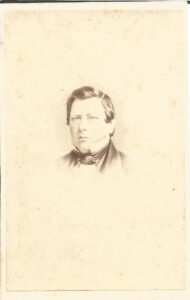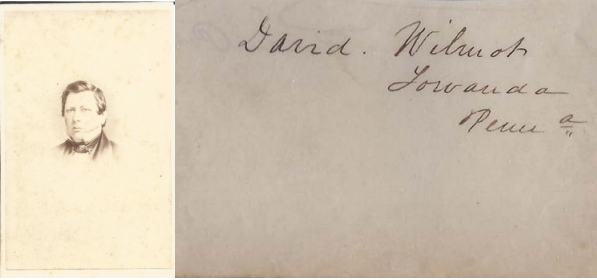August 8, 1846: The Wilmot Proviso Shakes The Foundation Of Congress
You are there: Fighting between American and Mexican troops begins along the Rio Grande border on May 3, 1846, and Congress officially declares war on May 13. By then, U.S. troops led by General Zachary Taylor have already won at Palo Alto and Resaca and are marching inland on their way to victories at Santa Fe and Monterrey. On June 14 upper California also falls to a band of Americans in the so-called Bear Flag Revolt.

So President Polk is in a very optimistic mood on August 8 when his bill to appropriate another $2 million to fund the war is taken up in the House. Then, in a flash, the entire political landscape and the course of American history changes around him.
It happens when a 32-year-old freshman Democrat from Pennsylvania rises to offer an amendment to the bill stating that he will support it…
Provided that as an express and fundamental condition to the acquisition of any territory from the Republic of Mexico to the United States…neither slavery nor involuntary servitude shall ever exist in any part of said territory.
Wilmot’s demand is reminiscent of the 1819 Tallmadge Amendment calling for a ban on slavery in the Missouri Territory that Jefferson called a “firebell in the night” for the South, and that resulted in Henry Clay’s saving 1820 Compromise.
Both bills threaten the South’s future economic growth which hinges on the creation of new plantations in the west to grow and sell more cash crops and to purchase excess slaves bred in the east at auctions. A ban on slavery would prove catastrophic to both outcomes.
The shock to the South grows when a vote on the “Wilmot Proviso” results in its passage by an 85-80 margin. Even more so when it becomes clear that the difference traces not to party lines (Democrats vs. Whigs) but instead to regionality. Thus Northern members approve it 83-12 while Southerners oppose it by 68-2.
Initial House Vote on the Wilmot Proviso (August 8, 1846)
| Region | Democrats Yes – No | Whigs Yes – No | American Yes – No | Total Yes – No |
| North | 52-4 | 26-8 | 5-0 | 83-12 |
| South | 0-51 | 2-17 | 0-0 | 2-68 |
| Total | 52-55 | 28-25 | 5-0 | 85-80 |
| (Not voting) | (32) | (23) | (1) | (56) |
Wilmot assures his colleagues that the ban is not driven by opposition to slavery on moral grounds. Instead, his intent is simply to reserve the land exclusively for white settlers and to preserve the dignity of free labor.
The result would put an end after 36 years to the Missouri Compromise which has quelled regional tensions by using the 36’30” longitudinal line to define Slave vs. Free States in the Louisiana Territory.
Approval of Wilmot’s Proviso in the House comes only two days before a recess in the 29th Congress, and the Senate is able to momentarily table it.
Senator John C. Calhoun takes the lead in summing up the situation:
- The North now enjoys a commanding majority of the votes in the House;
- The Wilmot measure shows that the North intends to stop the spread of slavery;
- The South can no longer count on support for their cause from Northern Democrats;
- Nor is there a ready-made solution in extending the old 36’20” compromise line.
When the members reconvene in December 1846, they vote down an even more divisive amendment offered by Democratic Congressman Preston King of New York seeking to extend the ban on slavery to include lands outside the United States.
But after more debate, on March 1, 1847, the Senate passes Thomas hart Benton’s $3 Million funding bill without Wilmot by 29-23; and two days later, the House approves it by 115-82, with Northerners now only 54-63 against. What apparently turns the tide here is the feeling that American soldiers risking their lives in the field deserve the support of their government.
While the immediate furor over the Wilmot Proviso lessens, its intent – to ban slavery in the west – surfaces and intensifies right up to Lincoln’s victory in the 1860 presidential race.
In 1848, the Democrats lose the White House to the Whig slave owner, Zachary Taylor, who promises to sign a Wilmot Bill should Congress send it up. In the 1850 Compromise, California’s admission gives the Free States a 16:15 edge over the Slave States in the Senate, while the South is left pinning its hope for the expansion of slavery on Stephen Douglas’ “popular sovereignty” voting process rather than a Federal mandate.
In 1855 the “popsov” option falls apart in the Kansas Territory leading to three years of bloody fighting before the Free State forces prevail. Finally in 1860 the Republican Lincoln is elected president and the Wilmot-like ban goes into effect in the west, provoking the Civil War.
